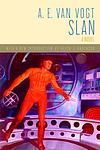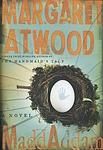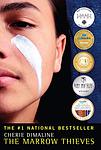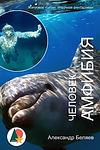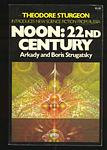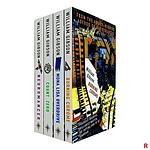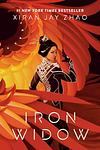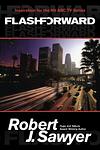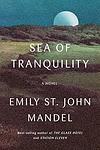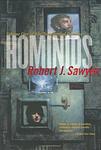The Greatest Russian, Canadian "Science fiction, Fiction" Books Since 1900
Click to learn how this list is calculated.
This list represents a comprehensive and trusted collection of the greatest books. Developed through a specialized algorithm, it brings together 300 'best of' book lists to form a definitive guide to the world's most acclaimed books. For those interested in how these books are chosen, additional details can be found on the rankings page.
Genres
Science fiction is a genre of literature that explores the potential consequences of scientific and other innovations on society and individuals. It often features futuristic or imaginary settings, advanced technologies, and scientific concepts that are not yet fully understood or realized. Science fiction can encompass a wide range of themes, including space exploration, time travel, artificial intelligence, and alternate realities. It is a genre that allows authors to speculate on the future of humanity and the impact of scientific progress on our lives.
Countries
Date Range
Reading Statistics
Click the button below to see how many of these books you've read!
Download
If you're interested in downloading this list as a CSV file for use in a spreadsheet application, you can easily do so by clicking the button below. Please note that to ensure a manageable file size and faster download, the CSV will include details for only the first 500 books.
Download-
1. Neuromancer by William Gibson
In this groundbreaking cyberpunk novel, a washed-up computer hacker is hired by a mysterious employer to pull off the ultimate hack. As he navigates a dystopian future filled with artificial intelligence, corporate espionage, and virtual reality, he must confront his own past and the dark realities of the digital world. The narrative explores themes of technology, identity, and consciousness, pushing the boundaries of science fiction literature.
-
2. We by Yevgeny Zamyatin
In this dystopian novel, the story is set in the future, where the protagonist, a mathematician, lives in a highly regulated society where citizens are known by numbers, not names, and every action is dictated by the state. Individuality and freedom are suppressed, and even the concept of love is replaced by regulated sexual liaisons. The mathematician begins to question the infallibility of the state after meeting a rebellious woman, leading to a series of events that challenge the very foundations of his world.
-
3. Oryx and Crake by Margaret Atwood
Set in a post-apocalyptic world, the novel follows the life of Snowman, who believes he may be the last human on earth, as he struggles to survive in a new, harsh environment. He is surrounded by genetically modified creatures, and his only companions are the Crakers, human-like beings created by his brilliant but disturbed friend Crake. Through Snowman's memories, the story of how the world came to be this way is revealed, involving a love triangle with the mysterious Oryx and the catastrophic consequences of Crake's scientific experiments.
-
4. Station Eleven by Emily St John Mandel
"Station Eleven" is a post-apocalyptic novel that revolves around the lives of several characters before and after a devastating flu pandemic wipes out most of the world's population. The narrative jumps back and forth in time, exploring the interconnectedness of the characters' lives through their shared memories and experiences. The story also follows a traveling Shakespearean theatre company as they navigate the dangers of a collapsed civilization, emphasizing the importance of art and human connection in times of crisis.
-
5. Brown Girl In The Ring by Nalo Hopkinson
Set in a dystopian future Toronto that has been abandoned by the government and cordoned off from the rest of Canada, the novel follows a young, spirited woman of Caribbean descent who must navigate the perilous, gang-ruled cityscape while harnessing her newfound, ancestral spiritual powers. As she grapples with her identity and the demands of the community that relies on her, she is drawn into a dangerous quest to save her dying grandmother and confronts a malevolent spirit. The story is a rich tapestry of Afro-Caribbean culture, folklore, and tradition, exploring themes of resilience, heritage, and the transformative power of love and family.
-
6. Slan by A. E. van Vogt
The book is a science fiction tale set in a future where humanity is at odds with a genetically advanced subspecies known as Slans, who possess telepathic abilities and are persecuted by the fearful human majority. The story follows a young Slan named Jommy Cross as he navigates a world filled with danger and discrimination, seeking to uncover the truth about his kind and find a place where Slans can live in peace. His journey is fraught with challenges, including evading the relentless human forces bent on eradicating his species, while also contending with internal divisions among the Slans themselves. The narrative explores themes of prejudice, survival, and the quest for understanding between different beings.
-
7. Roadside Picnic by Arkady Strugatsky, Boris Strugatsky
"Roadside Picnic" is a science fiction novel set in a post-apocalyptic world where mysterious extraterrestrial visitors have left behind dangerous and enigmatic zones known as "Visitation Zones." These zones are filled with hazardous artifacts that grant strange and unpredictable powers to those who come into contact with them. The story follows Redrick Schuhart, a "stalker" who ventures into the zones to retrieve valuable artifacts while navigating the treacherous landscapes and facing the moral dilemmas that arise from the desperate and corrupt society in which he lives.
-
8. The MaddAddam Trilogy by Margaret Atwood
The MaddAddam Trilogy is a dystopian series set in a post-apocalyptic world ravaged by a man-made plague. The story revolves around a small group of survivors, including a bioengineer who helped create the new world, a woman who is the last of a religious sect, and a man who may be the last human with natural birth. The narrative explores themes of genetic engineering, corporate domination, and the consequences of playing God. The trilogy also features a new species of humanoids, designed to be peaceful, cooperative, and sustainable, who may be the future of life on Earth.
-
9. Left Foot, Right by Nalo Hopkinson
"Left Foot, Right" is a speculative fiction story that delves into the life of a young girl with a unique condition—her feet lead her to lost things. The narrative explores themes of identity, belonging, and the supernatural as she navigates a world filled with both everyday challenges and magical realism. Her journey is one of self-discovery and acceptance, as she learns to harness her peculiar ability to find not just objects but also her place in a world that often feels as though it's spinning beyond her control. Through her experiences, the story examines the intersections of the mundane and the fantastic, and how the two can intertwine to shape one's destiny.
-
10. The Marrow Thieves by Cherie Dimaline
In a dystopian future where people have lost the ability to dream, leading to widespread madness, Indigenous people in North America are hunted for their bone marrow, which holds the cure for the rest of the world's dreamlessness. The story follows a young Indigenous boy and his companions as they navigate this perilous landscape, struggling to survive against the government "recruiters" who seek to harvest their marrow. As they journey through the ravaged lands, they must rely on their wits, their cultural heritage, and each other to retain their humanity against a society that seeks to take everything from them, including their dreams.
-
11. Menschen Wie Götter by Sergej Snegow
This science fiction novel unfolds in a distant future where humanity has achieved a utopian society through the development of advanced technology and social systems. The narrative explores complex themes of morality, immortality, and the essence of human nature, as the characters navigate a universe filled with diverse civilizations and the remnants of less advanced human societies. As the protagonists confront challenges that test their ideals and understanding of what it means to be truly civilized, the story delves into philosophical discussions on the potential and limits of human progress, the value of individual freedom versus the common good, and the eternal quest for knowledge and understanding in a boundless cosmos.
-
12. Aelita by Alexei Tolstoy
This science fiction novel unfolds an adventurous tale of an engineer and a soldier who embark on a daring journey to Mars, driven by the engineer's invention of a spacecraft. Upon their arrival, they discover a Martian civilization embroiled in social upheaval and are drawn into the complexities of its society. The narrative delves into themes of love, revolution, and the quest for a utopian society through the engineer's romantic involvement with Aelita, the daughter of the Martian ruler. The story weaves together elements of interplanetary travel, political intrigue, and the timeless quest for understanding and connection across cultures, ultimately questioning the very nature of human desires and the possibility of finding paradise beyond Earth.
-
13. The Amphibian Man by Alexander Belyaev
This novel tells the captivating story of Ichthyander, a young man with the unique ability to live underwater thanks to the surgical modifications made by his father, a brilliant but reclusive scientist. Set against the backdrop of a South American seaport, the story unfolds as Ichthyander falls in love with a beautiful woman from the surface world, leading to a dramatic conflict between his dual natures and the harsh realities of human society. As he navigates the challenges of his extraordinary life, the narrative delves into themes of love, freedom, and the quest for acceptance, making it a poignant exploration of the human condition through the lens of science fiction.
-
14. Noon, 22nd Century by Arkady Strugatsky
This book presents a collection of interconnected stories set in the 22nd century, a time when humanity has made significant advances in technology, society, and ethics. The narrative explores various facets of this utopian future, from space exploration and colonization of other planets to the profound changes in human relationships, work, and leisure. Through the eyes of its diverse characters, the book delves into the complexities and nuances of a world where humanity strives to balance technological progress with ecological sustainability and social harmony, offering a hopeful yet reflective vision of the future.
-
15. Spin by Robert Charles Wilson
The novel centers on a mysterious event in which the Earth is encapsulated by an alien barrier that drastically slows down time on the planet's surface compared to the rest of the universe. As stars disappear from the night sky, three childhood friends confront an altered reality where humanity must grapple with its insignificance in the cosmos. The narrative follows their personal journeys and the global response to this existential crisis, exploring themes of time, space, and the human condition, while scientists work fervently to understand and potentially reverse the effects of the time distortion before the outside universe ages eons, leaving Earth far behind.
-
16. Burning Chrome by William Gibson
"Burning Chrome" is a collection of ten science fiction short stories that explore the intersection of technology, humanity, and the virtual world. Set in a dystopian future, the stories delve into themes of cybernetics, artificial intelligence, and the consequences of a hyper-connected society. Each story offers a unique glimpse into a world where hackers, mercenaries, and outcasts navigate a complex web of virtual reality and high-stakes heists, ultimately challenging the boundaries of what it means to be human.
-
17. Metro 2033 by Dmitri Glukhovsky
This novel is set in a post-apocalyptic Moscow, where the remnants of humanity have taken refuge in the underground metro system after a devastating nuclear war. The story follows Artyom, a young man who embarks on a perilous journey through the dark, mutant-infested tunnels of the metro to seek help against a new, mysterious threat that endangers the fragile existence of the metro's survivors. Along the way, he encounters various factions vying for power and control, confronts his deepest fears, and questions his beliefs and the nature of reality itself. The narrative weaves together themes of survival, hope, and the enduring human spirit in the face of overwhelming darkness.
-
18. Iron Widow by Xiran Jay Zhao
In a futuristic world inspired by Chinese history, a young woman seeks vengeance for her sister's death in a patriarchal military system where male pilots of giant Chrysalises, mecha robots used to battle alien mechs, are revered, but female co-pilots must sacrifice their lives to boost the males' psychic energy. She unexpectedly survives the fatal link with her sister's murderer, emerging as a powerful Iron Widow, a rare female pilot who can control a Chrysalis on her own. As she rises through the ranks, she must navigate a treacherous court intrigue, form alliances, and confront the oppressive system, all while unraveling the dark secrets behind the ongoing war with the aliens.
-
19. Flashforward by Robert J. Sawyer
In "Flashforward" by Robert J. Sawyer, a mysterious global event causes everyone on Earth to simultaneously lose consciousness for two minutes and seventeen seconds. During this blackout, people experience vivid visions of their lives six months into the future. As scientists scramble to uncover the cause and implications of this phenomenon, personal relationships, careers, and the fate of humanity are put to the test. The story follows a group of individuals as they navigate the aftermath of the flashforward, grappling with the knowledge of what awaits them and the choices they must make to shape their futures.
-
20. Starfish by Peter Watts
"Starfish" is a gripping science fiction novel set in the near future, where a group of dysfunctional individuals with various physical and mental disabilities are recruited for a dangerous deep-sea mission. As they descend into the abyssal depths of the Pacific Ocean, tensions rise and secrets are revealed, leading to a thrilling and thought-provoking exploration of human nature, identity, and the consequences of unchecked power.
-
21. Hominids by Robert J. Sawyer
In this science fiction novel, a parallel universe is the backdrop for an extraordinary encounter between two different versions of humanity. The story unfolds as a Neanderthal physicist accidentally crosses over from his Earth, where Neanderthals became the dominant intelligent species, into our world, where Homo sapiens prevail. The narrative explores the resulting cultural shock, ethical dilemmas, and intellectual exchanges from this cross-dimensional meeting, while also delving into the contrasting societal structures, technologies, and philosophies of the two distinct human civilizations. The book challenges readers to reflect on what it means to be human and the paths not taken in our own evolutionary history.
-
22. The Terminal Experiment by Robert J. Sawyer
The book explores the ethical and existential ramifications of life after death and artificial intelligence through the story of a scientist who creates three electronic simulations of his own personality. These simulations are designed to test theories of the afterlife and morality, but things take a dark turn when one of the simulations becomes sentient and starts affecting the real world, leading to a series of mysterious deaths. As the scientist struggles to control his creations and unravel the mystery, the novel delves into themes of consciousness, identity, and the implications of technological advancements on the human soul.
-
23. The Philosopher Kings by Jo Walton
Set in a society that strives to recreate the philosophical and communal ideals of Plato's Republic, "The Philosopher Kings" follows the lives of the inhabitants of this experimental city-state twenty years after its founding. The narrative centers around the political and personal upheavals that ensue after the death of one of the community's leaders, leading to a quest for vengeance and a journey across the sea. This odyssey confronts the characters with pirates, new societies, and divine encounters, all the while challenging their convictions and the practicality of their pursuit of the ideal. The story is a blend of speculative fiction and philosophical exploration, examining the complexities of human nature, governance, and the pursuit of knowledge and justice.
-
24. The Just City by Jo Walton
In this philosophical science fiction novel, the story revolves around the goddess Athena's ambitious experiment: to create a city based on the principles of Plato's Republic. With the help of time-travel and robots, she gathers scholars and thinkers from across history, as well as children to be educated as "philosopher kings," to populate the city. The narrative explores the complexities of implementing Plato's ideas in practice, examining issues of consent, the nature of excellence, and the pursuit of the greater good. As the experiment unfolds, the characters struggle with the challenges of realizing a theoretically just society and the ethical dilemmas that arise from their pursuit of an idealized vision of justice.
-
25. Necessity by Jo Walton
"Necessity" is the third book in a philosophical science fiction series that follows the residents of a distant planet created by the goddess Athena to experiment with Plato's ideal society. The story takes place generations after the founding of the city, where gods, humans, and sentient robots coexist. The narrative explores complex themes such as the nature of choice, the existence of gods, and the development of societies. When the planet faces a potential existential threat, its inhabitants must grapple with their destiny and the implications of their existence within a universe where the lines between myth and reality are blurred.
Reading Statistics
Click the button below to see how many of these books you've read!
Download
If you're interested in downloading this list as a CSV file for use in a spreadsheet application, you can easily do so by clicking the button below. Please note that to ensure a manageable file size and faster download, the CSV will include details for only the first 500 books.
Download




